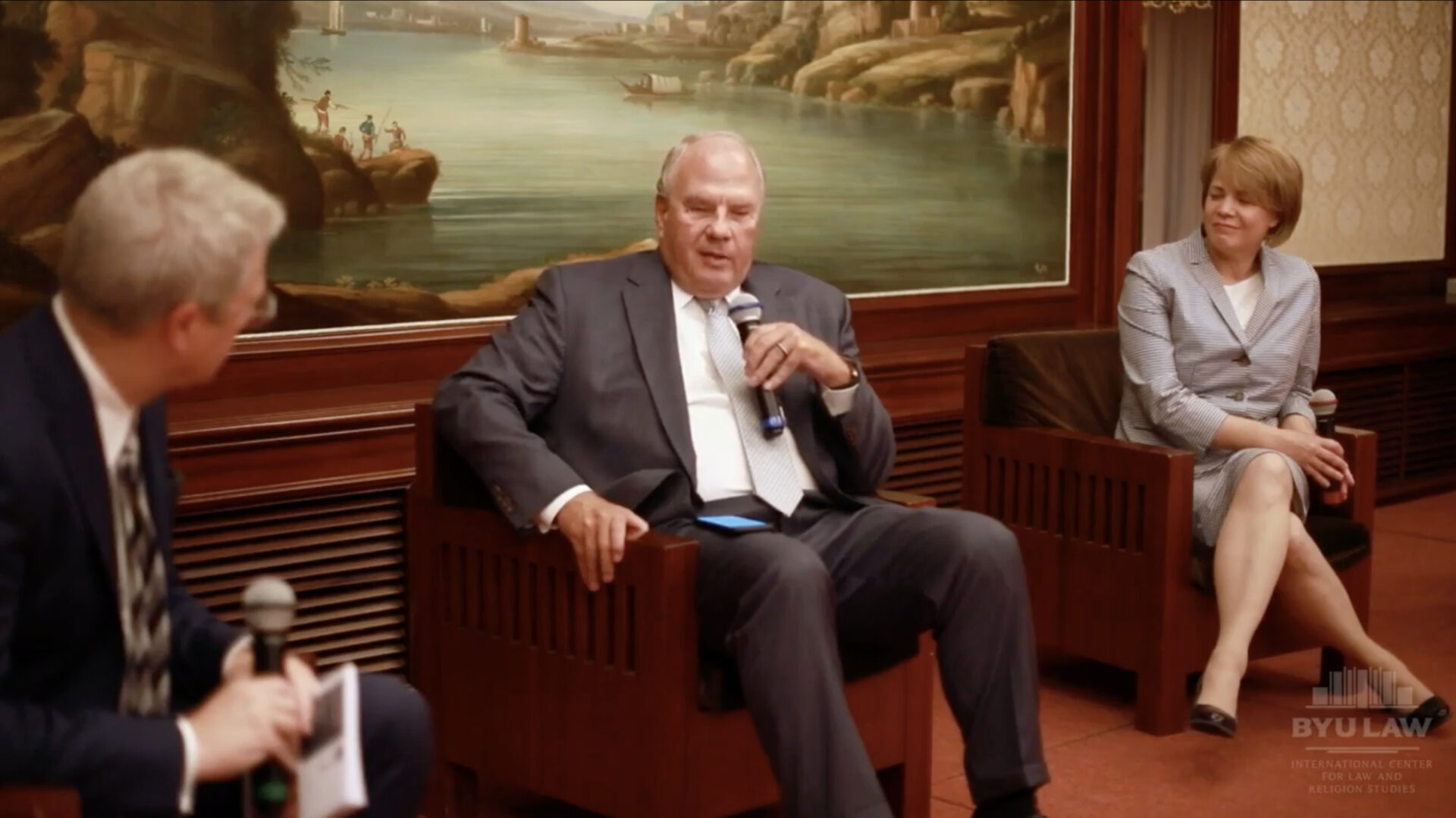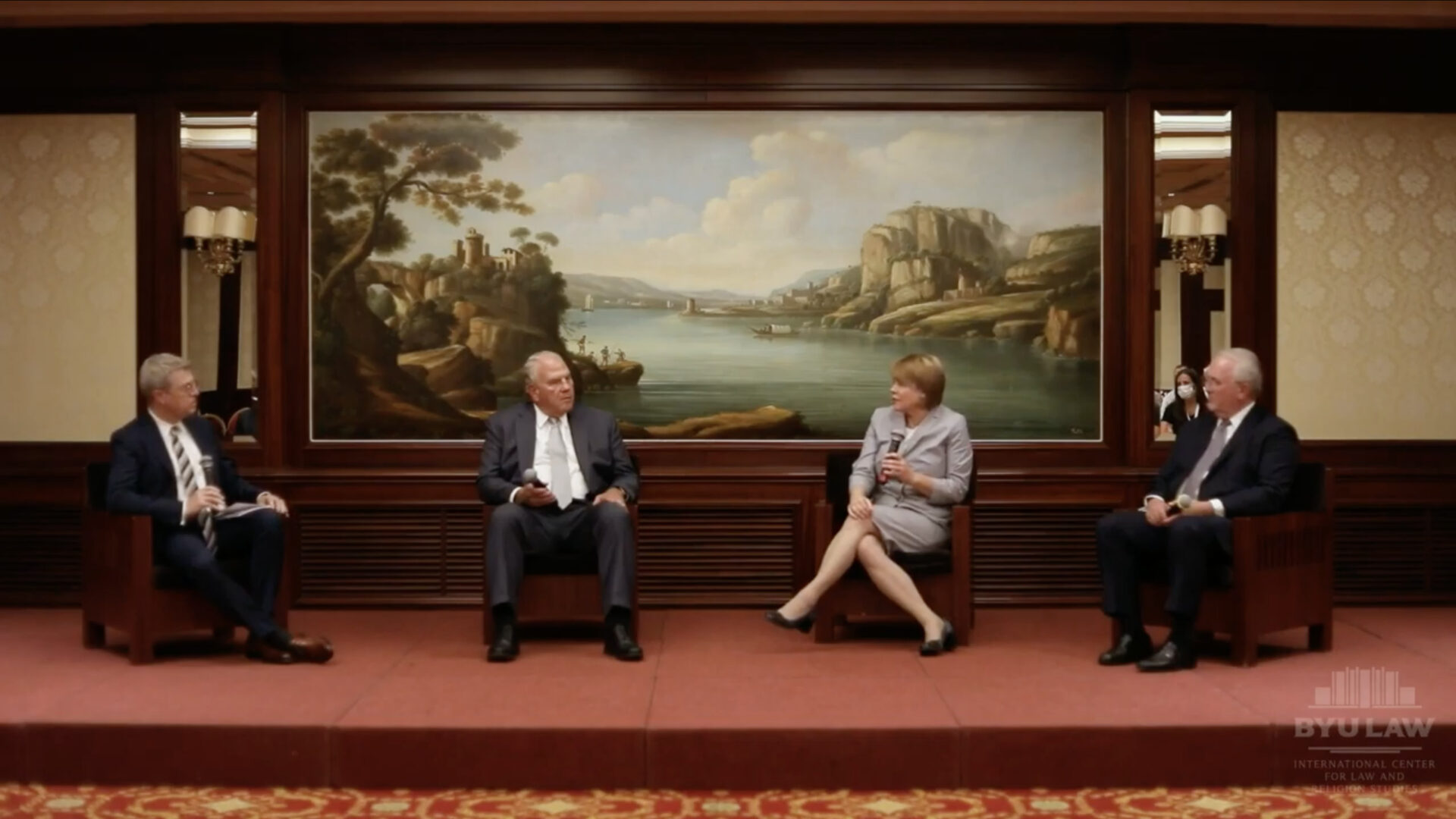
Leaders of The Church of Jesus Christ of Latter-day Saints began the 28th Annual Law and Religion Symposium Sunday night with a discussion about healing and equal privileges of belief among all people.
Panelists included Elder Ronald A. Rasband of the Quorum of the Twelve Apostles, Sister Sharon Eubank, first counselor in the Relief Society general presidency and president of Latter-day Saint Charities, and Elder Jack N. Gerard, a General Authority Seventy. Brett G. Scharffs, a professor at BYU’s J. Reuben Clark Law School and director of the International Center for Law and Religion Studies, moderated the discussion.
The symposium is hosted annually by BYU Law School’s International Center for Law and Religion Studies. This will be the second time the symposium has been hosted virtually because of the COVID-19 pandemic. Sunday’s session was pre-recorded at the G20 Interfaith Summit in Bologna, Italy.
The theme of Sunday night’s keynote session was “A Time to Heal: Peace Among Cultures, Understanding Between Religions.”
Elder Rasband began the discussion by sharing what he called the “essence” of the Church’s approach to religious liberty — the 11th Article of Faith. It states that “we claim the privilege of worshipping God according to our own dictates and we allow all men that same privilege.”
Elder Rasband said, “We want to be given the opportunity to say and do and feel and speak that which we believe as a church. . . But we are just as anxious to have everyone else have the same privilege.”
The 11th Article of Faith perfectly describes what Scharffs called the “reciprocal nature” of religious freedom, “that it needs to be for all people in all places.”

Sister Eubank then described what the pandemic has taught her. “If everyone isn’t protected, then nobody is protected,” she said. “That’s true in the pandemic, but it’s also true in the issues … about literacy, about health, about infant mortality, about all those difficult issues that are just chronic, and they go along in the world.”
She then explained that the best solutions for these problems will be implemented at a grassroots level, within the family. That is where the real potential for positive change lies, according to Sister Eubank.
Elder Gerard then spoke briefly about that session’s theme. “If you believe all the surveys that are taken, there are fewer people of faith today in the world,” he began. “When we see that trend, we need to coalesce together and make sure we put aside any of our differences and focus on those things that we collectively believe in order to help this healing process.”
That comment began a theme of collaboration and relationship building that continued throughout the discussion.
“Now’s the time to put true religion into practice — from our Christian perspective — to join with our brothers and sisters all over the world, Muslim world, the Jewish world, whatever it may be,” Elder Gerard said.
Sister Eubank shared her experiences of reaching out to and working with religious leaders of other faiths during the pandemic. Specifically, she talked about collaborating with Suzanne Sahloul, a member of the Syrian community in Michigan, who helps Afghan refugees resettle in the United States.
“It’s about human connection,” Sister Eubank said. She described how building the bridges between faith communities is more than simply professional work.
Elder Rasband then discussed the work the First Presidency does to build strong relationships with world leaders. He went into detail about President Nelson’s recent relationship with the NAACP and the new initiatives that are going to take place as a result. “We have become brothers,” Elder Rasband said as he described the relationship.
The panelists concluded their remarks with comments about a common connection between people of all faiths around the world as children of God.
“We build the relationship, we knock down the barriers, we improve understanding, then we come to know each other for who we truly are, what we feel in our hearts, not as different races, not as different demographics, but truly all children of a Heavenly Father,” Elder Gerard said.
Sister Eubank said, “We are not in this for selfish reasons. We are in this with you because of our love of God.”
Each year, the International Center for Law and Religion Studies hosts this conference and invites speakers and delegates from around the world to discuss matters pertaining to religious freedom. These discussions are held between people of all different faiths and backgrounds.
Additional sessions of the Law and Religion Symposium will be held on Tuesday beginning at 8 a.m. The day will begin with a keynote discussion and then move on to a regional breakout session where delegates from certain areas can discuss more local matters.
Monday’s theme was “Challenges and Keys to Successful Collaborations in Promoting Freedom of Religion or Belief.” Tuesday, the opening session will discuss the theme, “Working Together to Promote Freedom of Religion or Belief in a Divisive World.” Translation is available in Spanish, Portuguese, French and Russian.




